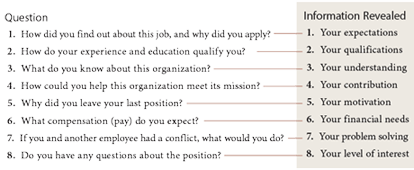Web Page: Acing the Interview
Web Page: 8 Tips for Acing a Tough Job Interview
Web Page: The Complete Guide to Body Language
After applying for a job or sending out a résumé, interested employers may ask you to interview for the position to find out more about you. You can prepare for an interview by anticipating the employer’s questions and having answers ready. Here are common questions employers ask and the information they are seeking:

Your Turn Imagine that you are interviewing for a job you would really like to have. Write an answer to each of the questions above.
Use the following techniques to ensure that you understand what the interviewer is saying.
Could you explain what you mean by “professional”?
So, you are asking what duties I performed at my uncle’s shop, is that right?
If you are asking whether I would be available to work on Sundays, the answer is that my Sunday afternoons are free.
Your Turn For each interview question below, write a response, following the directions in parentheses.
Though your answers are important, remember that the interviewer is considering other attributes that tell a lot about you. These nonverbal signals that you give should be moderate in nature, neither over the top nor under the radar.
Don’t be even one minute late . . . or 30 minutes early.
Don’t wear street clothes . . . or a tuxedo.
Don’t look away the whole time . . . or engage in a staring contest.
Don’t look sullen or bored . . . or fanatically thrilled.
Don’t offer a limp handshake . . . or crush the person’s hand.
Don’t slouch or lean . . . or be stiff and rigid.
Don’t mumble at a snail’s pace . . . or chatter incessantly.
Don’t be sarcastic . . . or pompous.
Don’t use slang or street language . . . or sound pretentious.
Don’t yawn and drowse . . . or tremble with excitement.
Don’t be apologetic and self-deprecating . . . or be arrogant.
Don’t be a lapdog . . . or a pit bull.
Your Turn Conduct a mock interview with a classmate, who will pretend to be a grocery- store owner who is seeking new cashiers. He or she will ask you the eight questions listed at the top of the previous page, and you will answer them. Afterward, ask the classmate to rate you for each of the 12 points above, using this scale:

A perfect total score would be 24. Scores below 20 may mean you need to ramp things up, while scores above 28 may mean you need to tone things down.
Web Page: Acing the Interview
Web Page: 8 Tips for Acing a Tough Job Interview
Web Page: The Complete Guide to Body Language
© 2014 Thoughtful Learning
